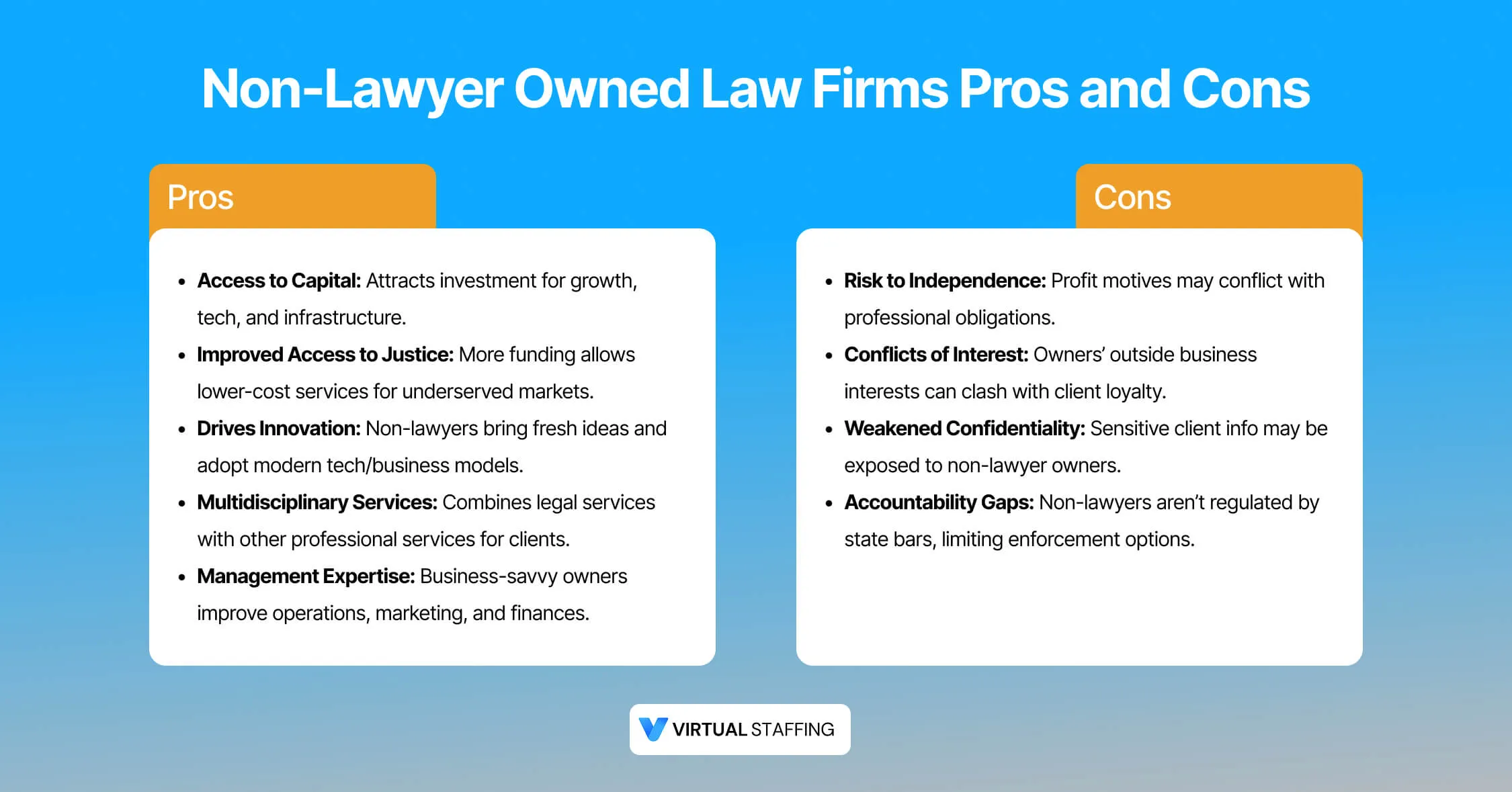The idea of investing in a law firm or exploring business opportunities in the legal industry can be appealing. You’ve probably wondered whether you need a law degree to own part of a law firm. The answer isn’t as straightforward as you might think. The rules governing law firm ownership vary depending on where you're located.
While the majority of U.S. jurisdictions maintain strict restrictions, a shift is happening that's opening the door to non-lawyer ownership. Understanding these regulations is crucial as you plan partnership or investment opportunities, so let's take a closer look.
Why Most States Prohibit Non-Lawyer Ownership
The American Bar Association (ABA) has long maintained a firm stance against non-lawyer ownership through Model Rule of Professional Conduct 5.4, entitled “Professional Independence of a Lawyer.” The rule:
- Prohibits a lawyer or law firm from sharing legal fees with a non-lawyer, except in limited circumstances such as death benefits, sale of a practice, profit-sharing arrangements for non-lawyer employees, and court-awarded fees shared with nonprofits.
- Forbids forming a partnership with non-lawyers if any part of the partnership’s business involves the practice of law.
- Prevents third parties (who pay, employ, or recommend the lawyer) from directing or regulating the lawyer’s professional judgment.
- Prohibits a lawyer from practicing in a firm if a non-lawyer (1) holds any ownership interest in the firm, (2) serves as a corporate director or officer, or (3) has the authority to direct or control the lawyer’s professional judgment.
The reasoning behind ABA Rule 5.4 centers on three core concerns:
- Protection of attorney-client privilege. When non-lawyers have financial stakes in legal outcomes, there's a risk they might pressure attorneys to breach confidentiality or make decisions that prioritize profit over client interests.
- Professional independence. Lawyers must exercise independent judgment when representing clients. If business partners or investors can influence legal strategy, that independence becomes compromised.
- Accountability. State bar associations can discipline attorneys for ethical violations, but they have no authority over non-lawyer owners. This creates a regulatory gap that could leave clients vulnerable.
While the ABA rules are not binding law, most states have adopted them as the foundation of their legal ethics framework.
However, critics—including scholars at Stanford Law School—argue that reforming Rule 5.4 could benefit both lawyers and consumers by promoting innovation and increasing access to justice. This debate has led several jurisdictions to experiment with alternative ownership models.
Can a Non-Lawyer Own a Law Firm?
In most U.S. states, the answer is no—non-lawyers cannot own a law firm unless they are licensed attorneys. However, there are some states with exceptions that allow non-lawyer ownership under specific regulatory frameworks.
Jurisdictions That Allow Non-Lawyer Ownership
A small but growing number of jurisdictions have amended their Rule 5.4 to allow limited non-lawyer ownership of law firms. Below is a detailed breakdown of where non-lawyer ownership is currently permitted:
These exceptions are not a free-for-all. Firms typically must submit detailed plans to the state bar or Supreme Court demonstrating how the structure will protect ethical integrity and client interests.
Arizona and Utah are often cited as models, as they were among the first jurisdictions to reform Rule 5.4. Their approaches are closely watched by other states considering similar reforms. Early evidence suggests that these models can increase innovation and access to justice, although concerns about maintaining professional standards remain.
International Perspective: Countries Allowing Non-Lawyer Ownership
If you're looking beyond the U.S., the landscape is quite different. Non-lawyer ownership has existed in some countries for decades, often with notable results and relatively few public complaints.
Australia
Australia introduced Alternative Business Structures (ABS) in 2001, becoming one of the first common-law countries to permit non-lawyer ownership of law firms. Law firms can be publicly listed companies, accept private equity investment, and partner with other professional service providers.
The goal is to bring in external capital and professional management expertise. These firms are subject to strict regulatory oversight to maintain professional standards. Non-lawyers can make business decisions, but they cannot interfere with lawyers' professional judgment or client relationships.
United Kingdom
The UK's Legal Services Act of 2007 allowed non-lawyer ownership beginning in 2011. The Act established a regulatory framework in which non-lawyers can become owners by meeting a “fitness test” set by licensing authorities.
The Solicitors Regulation Authority oversees these firms and requires each to appoint roles that ensure professional obligations are met while balancing business interests.
Canada
Regulation in Canada varies by province, with most maintaining traditional restrictions. However, British Columbia and Ontario launched regulatory “sandboxes” in 2020 that permit non-lawyer ownership.
In Ontario, non-lawyers can provide certain legal services without lawyer supervision, and partnerships between lawyers and paralegals are permitted for specific practice areas. In British Columbia, notaries public are allowed to offer many legal services traditionally reserved for lawyers.
These provincial experiments reflect Canada's more cautious approach compared to Australia or the UK. The changes focus on expanding access to legal services in underserved areas rather than attracting major capital investment.
Can a Paralegal Own a Law Firm?
Generally, no—the same restrictions that apply to non-lawyers also apply to paralegals. Because paralegals are not licensed attorneys, they cannot own a law firm in most U.S. jurisdictions, unless they are in one of the jurisdictions that allow non-lawyer ownership, such as Utah, Arizona, or the District of Columbia.
A common misconception is that because paralegals have legal training and experience in the legal field, they have more ownership rights than other non-lawyers. However, Rule 5.4 doesn't create any special exceptions based on legal knowledge or training.
Pros and Cons of Non-Lawyer Owned Law Firms

Like any significant regulatory change, allowing non-lawyer ownership creates both opportunities and challenges. Before deciding to adopt non-lawyer ownership, it's helpful to weigh the advantages and potential drawbacks. Here are key points to consider:
Pros
- Increased access to capital. Non-lawyer ownership allows law firms to attract investment from external sources such as venture capital, private equity, and public markets. This capital can fund technology adoption, operational expansion, and infrastructure improvements.
- Improved access to justice. With more funding, firms can offer lower-cost legal services, targeting underserved markets that traditional firms may ignore due to profitability concerns.
- Drives innovation. Non-lawyers are often less constrained by legal tradition and bring innovative perspectives. They're more willing to adopt new technologies or business models, modernizing the legal sector and enabling more client-centric services.
- Multidisciplinary services. This model allows legal services to be bundled with other professional services like accounting, financial planning, real estate, or consulting. With this integration, clients can receive coordinated advice rather than obtaining services from multiple providers.
- Management expertise. Non-lawyer owners frequently come from industries such as finance or technology, bringing business experience or MBA-level management practices that improve firm operations, marketing, work environment, and financial performance.
Cons
- Risk to professional independence. The primary concern under the ABA's Rule 5.4 remains valid, as non-lawyer owners may prioritize profitability over professional obligations.
- Conflicts of interest. If a non-lawyer owner has business interests outside the firm, those interests could conflict with the duty owed to a law firm client. The lawyer's loyalty must be solely to the client.
- Weakened attorney-client privilege. Sharing sensitive client information with non-lawyer owners can raise concerns about confidentiality. While regulations attempt to address this, the risk increases if non-lawyers require access to such information for business decisions.
- Accountability gaps. While state bars can discipline attorneys for ethical violations, they have no authority over non-lawyer owners. If a non-lawyer owner pushes unethical practices, remedies may be limited to civil lawsuits rather than professional sanctions.
Final Thoughts
While non-lawyer ownership of law firms is still not widely allowed in the U.S., the small but growing number of jurisdictions adopting it could serve as a model for others in the near future.
Whether a law firm is owned by a lawyer or a non-lawyer, it's not immune to challenges, but each model offers certain advantages. As more jurisdictions experiment with different ownership structures, we'll gain clearer evidence about which approaches best serve clients, attorneys, and the public interest.
Running a law firm—whether you're a lawyer or non-lawyer—remains a daunting task due to the many responsibilities required to maintain productive operations. Having the right professional support can make a significant difference. Virtual legal professionals, such as those from Virtual Staffing, can handle key legal tasks that drive improvements in efficiency and client service.




.webp)
.webp)
.webp)